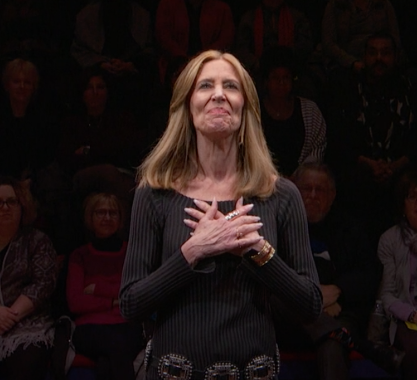
By Ron Fassler
“What we are taking about is a revolution, not reform.”
So said Gloria Steinem, one of the most important people in the history of the Women’s Movement, still, even after all these years, sadly in need of advocation. The theatre is as strong an outlet as any for examining women’s issues going as far back as Henrik Ibsen’s A Doll’s House in 1879. So, it was certainly inevitable that at some point Gloria Steinem’s story would be made stage worthy. Which brings us to Emily Mann’s Gloria: A Life that premiered off-Broadway in October of 2018, and thankfully was filmed for television during its five-month run. PBS smartly picked it up to broadcast and it premiered last night on Great Performances, shot at the Daryl Roth Theatre with its original cast intact. It is an essential piece of history that needed to be made available in this way so that anyone with an interest in theatre and in women’s rights may see it.


Christine Lahti
What the play gets into, much to Mann’s credit, is that Steinem’s passion was brought out of personal experience which fueled her convictions. In a 90-minute span, we see her narrate her life as a six-person cast of women play all the other roles. The indispensable Christine Lahti, a smart choice due to her size and stature, plays Gloria from young idealist to mature survivor. The theatre’s configuration is the audience on all four sides, which allows for Lahti to directly communicate with the men and women surrounding her, often sharing a wink and a nudge and a laugh. It feels free flowing and mostly avoids the trap of preaching, keeping everything moving from incident to incident, which is a heavy load when you consider that Steinem’s life has spanned much of the late 20th century’s ups and downs of social upheaval—a great deal of which she played a vital part. Credit must be given to Diane Paulus’s fluid staging and casting women with diversity towards race and color to create a beautiful acting company.
It’s all here. Steinem’s blossoming as a feminist, struggling as a female journalist in a man’s profession, her rather bleak upbringing (her mother suffered her whole life with mental illness and her father fled, leaving a very young Gloria to care for her mom) and her creating Ms. Magazine (more or less single-handedly willing the term Ms. into its current popular usage). We see her battle to get the Equal Rights Amendment passed, a fight that took many years and to this day is still not the law of the land. But above all, we are engaged with a woman open to new experiences, capable of listening, and even admitting when she was wrong. A fallible, glorious woman.
Early in the evening, she calls herself a “hope-aholic.” Which is a truism, as her optimistic drive must have something to do with her still going strong in her ninth decade. She says she intends to live to a hundred in order to see that the work is completed, because not only has she worked towards an end to sexism, but racism and homophobia and all the other necessary movements out there. And in battling the patriarchy, she and her compatriots have been doing nothing less than, in Steinem’s own words, “trying to change the oldest power inequity on the planet.”
The cast consists of a group of women who are all first-rate actors and who have many dramatic moments of their own as they enter and exit Steinem’s story. They include: Joanna Glushak, Fedna Jacquet, Francesca Fernandez McKenzie, Patrena Murray, Delanna Studi and Liz Wisan. All rise to the material they’re given, and it would be unfair to single out a single one of them. If ever an ensemble acting award is required, this would be it.


Gloria Steinem
The production is enhanced by visual aids designed by Elaine J. McCarthy, projected on screens visible on two sides of the theatre. They, along with the set design of Amy Rubin, work well to propel the action and help create different atmospheres by way of suggesting crowds, etc.
This PBS version also offers something very special: a half-hour bonus of a “talking circle” with audience members led by Gloria Steinem herself. When she comes out, dressed identically to Christine Lahti, it’s quite a moment. But do take in this section as it is a perfect compliment to the play. Even though it’s unscripted, sometimes what is said tops the written play. People bearing witness to what Steinem has meant to them personally was something I found very moving—especially seeing Steinem so strong and mighty at eighty-six years of age, still leading the charge.
Gloria: A Life is now streaming on PBS’s Great Performances. Check your local PBS station or go to https://www.pbs.org/video/gloria-a-life-wx5l3u/?source=amazoncdf. thru July 24, 2020





















